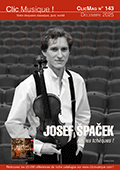|
|
|
Format : 1 CD
Total Time : 00:55:06
Recording : 2021
Location : Unterretzbach
Country : Autriche
Sound : Stereo
Label : Gramola
Catalog No. : GRAM99274
EAN : 9003643992740
Price Code : DM020A
Publishing Year : 2022
Release Date : 01/10/2022
Genre : Classical
|
|
 |
Johann Sebastian Bach (1685-1750)Contrapunctus I en ré mineur, extrait de "L'Art de la Fugue" Prélude choral "Nun komm, der Heiden Heiland", BWV 659 Joseph Haydn (1732-1809)Finale du quatuor à cordes en ré majeur, op. 64/5, Hob. III:63 "L'Alouette" Adagio du Quatuor à cordes en si majeur, op. 1/1, Hob. III:1 Wolfgang Amadeus Mozart (1756-1791)Allegretto du Quatuor à cordes en ré majeur, K 575 Felix Mendelssohn Bartholdy (1809-1847)Caprice en mi mineur, op. 81 Edward Elgar (1857-1934)Nimrod Antonín Dvorák (1841-1904)"O, nasi Iasce nekvete to vytouzene stesti", extrait de "Cyprès" Robert Schumann (1810-1856)Scherzo du Quatuor à cordes en la mineur, op. 41/1 Giacomo Puccini (1858-1924)Crisantemi Dimitri Chostakovitch (1906-1975)Polka, op. 22 Anton Webern (1883-1945)Langsamer Satz en mi bémol majeur Arioso Quartett Wien
Martin Klimek, violon
Libor Meisl, violon
Wolfgang Prochaska, alto
Benedikt Endelweber, violoncelle
|
 
 A not negligible part of the concert programs of the Arioso Quartet Vienna, which has existed for more than 25 years, have undoubtedly been the encores presented. The musicians Martin Klimek and Libor Meisl, violins, Wolfgang Prochaska, viola, and Benedikt Endelweber, violoncello, therefore present their most popular and successful encores on this CD under the title “Encores”. Starting with a movement from J. S. Bach’s “Art of the Fugue”, there are audience hits such as “Nimrod” from the Enigma Variations by Elgar or Puccini's “Crisantemi”, quartet movements from the time of Viennese Classicism by Mozart and Haydn, but also late Romantic repertoire such as movements from works by Schumann, Dvorák or Mendelssohn Bartholdy, to the Polka from the ballet “The Golden Age” by Shostakovich and “Langsamer Satz” (Slow Movement) for string quartet by Anton Webern. Being the final encore, the chorale prelude "Nun komm, der Heiden Heiland" is again a work by J. S. Bach, who thus represents the proverbial alpha and omega of the program.
 |
| . |
 |
|
|
